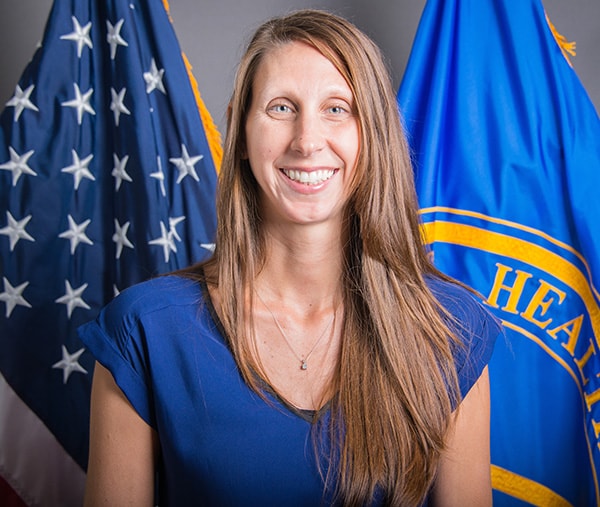Mining Feature: Emily Haas, Ph.D., Selected for Presidential Honor
Friday, July 12, 2019

Emily J. Haas, Ph.D.
Research behavioral scientist Emily Haas has been selected for a Presidential Early Career Award for Scientist and Engineers (PECASE).
Emily Haas, Ph.D., a behavioral scientist with the Pittsburgh Mining Research Division, was named a recipient of this year's Presidential Early Career Award for Scientists and Engineers (PECASE).
A PECASE is the highest honor given by the U.S. government to science and engineering professionals in the early stages of their research careers. Selected from among a dozen federal agencies and departments, recipients are chosen for their pursuit of innovative research at the frontiers of science and technology and their commitment to community service as demonstrated through scientific leadership, public education, or community outreach. She will receive her award at a July 25, 2019, ceremony in Washington, D.C.
In nearly seven years at NIOSH, Dr. Haas created a unique approach to assess and improve safety climate at mine sites, an issue that was previously unexplained and historically unyielding to investigation. From 2016 to 2018, she studied aspects of safety climate with approximately 2,700 mine workers at 40 mines, both domestically and internationally. She helped management develop site-specific interventions to improve their health and safety processes. For example, one company updated its annual safety training to include modules on worker participation, coworker communication, and leadership and developed risk tolerance modules that were distributed via YouTube. These videos have reached 24,100 employees across more than 1,300 operations in 44 states and provinces in the U.S. and Canada. A corporate safety manager credits Dr. Haas’ efforts to reducing his company’s safety incidents from 2016 to 2018. Several construction companies also link to these videos from their websites, so her work is having impact beyond the mining industry.
Dr. Haas also led a cooperative behavioral/engineering intervention to reduce respirable dust exposure in the industrial minerals and metal/non-metal industry, which employs approximately 58,106 workers. Dr. Haas added a new dimension - behavioral interventions - to previously held dust control approaches. She identified quick, economic controls that reduced personal dust exposure reductions up to 92% after making behavioral changes and up to 99% after making organizational changes to equipment. The impact of this work earned Dr. Haas international recognition and also spurred additional collaborative efforts to integrate technology at her workplace.
- Coal Mine Safety Achievements in the USA and the Contribution of NIOSH Research
- NIOSH Hazard ID 4 - Ignition Hazard from Drilling into Sealed Frames of Agricultural Equipment
- NIOSH Mining Update - New Publications 1995-96
- Noise Source Identification on a Horizontal Vibrating Screen
- Origin of Mining-Induced Fractures Through Macroscale Distortion
- Performance of a Light-scattering Dust Monitor in Underground Mines
- Proceedings: New Technology for Ground Control in Retreat Mining
- A Summary of U.S. Mine Fire Research
- Technology News 473 - The Explosion Hazard From Hydrogen Gas Generation Inside Sealed Frames
- USBM Health and Safety Legacy Continues Under NIOSH